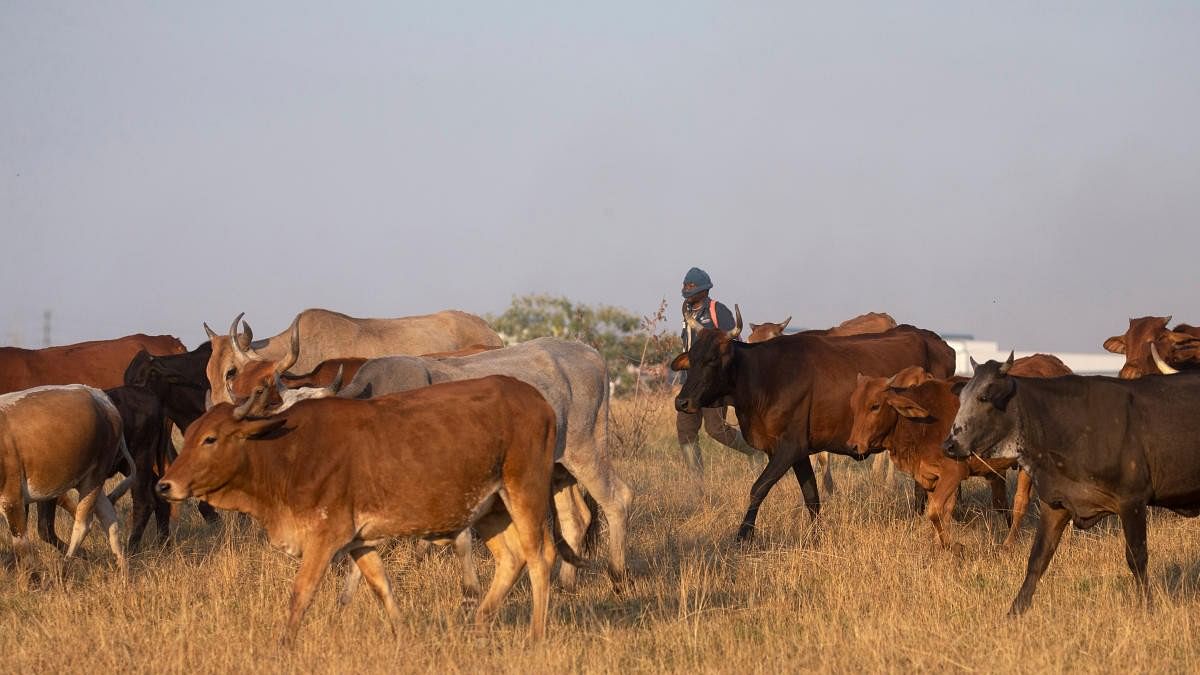
A man herds cattle. Image for representation.
Credit: Reuters Photo
Bongaon: In the bustling border town of Bongaon, situated along the porous Indo-Bangladesh border in West Bengal, crackdown on cattle smuggling and changes in goods truck movement regulations across the border have triggered a chain reaction of alternative smuggling activities, youth migration to other states, and rising unemployment.
For decades, Bongaon has been synonymous with clandestine cattle trade, where herds were illegally ferried across the border under the cover of darkness. This illicit business, worth hundreds of crores of rupees involving influential and powerful individuals, accounted for the region's parallel economy, many say.
However, stringent measures by the BSF have led to a complete shutdown of cattle smuggling in the Bongaon area over the last few years.
"The menace of cattle smuggling has now completely stopped. While most of those previously involved in this trade have switched to smuggling of gold, Phensedyl syrup, contraband drugs and electronic items, others have moved elsewhere in search of legitimate jobs," a senior BSF official of the South Bengal Frontier said.
Local BJP MLA Ashok Kirtania conceded that cattle smuggling crackdown has led to a chain reaction.
"People were involved in this illegal trade both directly and indirectly. Those directly involved have switched businesses, but those indirectly involved were mostly poor and have now shifted to other states in search of new jobs," he said.
Residents of the region alleged that the introduction of an online slot booking system for border crossing vehicles by the West Bengal government, though done to streamline the process and boost exports, has ended up in adding to the economic woes of the locals.
The state introduced the slot booking system at the Petrapole land border in Bongaon to reduce the detention time of goods vehicles, allowing exporters to send their trucks directly to Bangladesh without having to transfer goods to local trucks as was the system before.
The new rule, local truck operators grudged, has created livelihood problems for vehicle owners, drivers, transporters, and labourers. Transporters argue that goods were previously unloaded and loaded at various local warehouses, providing employment to thousands of people from the area that's now lost.
"The slot booking system was supposed to make things easier. Instead, it has created massive economic problems for local transporters who are now out of jobs. A truck coming from Punjab can now directly book a slot and move to the other side. Earlier, goods were unloaded here and then transported by local trucks to Bangladesh," says Anil Sarkar, a truck operator.
"Many of those involved in this transport trade have left Bongaon in the last two years," he said.
The economic repercussions of the slowdown also extend beyond immediate livelihood concerns. Depletion of human capital threatens to stifle the region's development prospects, hindering efforts to foster sustainable growth and prosperity.
Bongaon, once a bustling hub of trade and commerce, now grapples with the harsh reality of stagnation and regression.
"Economic activities here have slowed down drastically," says Suman Ghosh, a local shop owner. 'There are fewer customers, and businesses are suffering.
"Eighty per cent of the people in Bongaon are involved in import-export business. There are 200 transporters, 150 to 200 warehouses and their employees, more than 7,000 trucks and truck drivers, and thousands of people who will lose their jobs. We oppose this decision of the state government," BJP district president Debdas Mondal said.
Kirtania conceded the transportation industry crisis in this border area.
"This slot booking system of the state government to fill its coffers has led to major loss of livelihoods for people in the area. Bongaon's border economy heavily relies on the local transport business which is now completely ruined. Several trucks are lying on the roads and have been out of service for the last two years. Warehouses too are not getting business like before," he told PTI.
"Many people have either moved to other states or are now driving Toto and vans in rural areas," Kirtania said.
The TMC, however, feels that the issue has been blown out of proportion and that the state government has taken all measures to address the problems of unemployment.
"The new system was introduced so that goods don't get damaged while waiting here for days. If it has created some problems, the state government has taken adequate measures to address them," TMC leader Ratan Ghosh said.
Bongaon currently struggles amid these uncertainties even as the region goes to polls on May 20 during the fifth phase of elections. And it's the local youth who seem to be impacted by the developments, one way or the other.
"With their primary source of income abruptly severed, many young individuals find themselves grappling with uncertainty and financial instability," Lipton Roy, a local leader of the region's dominating Matua Namasudra community which is believed to hold the key to the Bongaon seat’s electoral outcome, said.